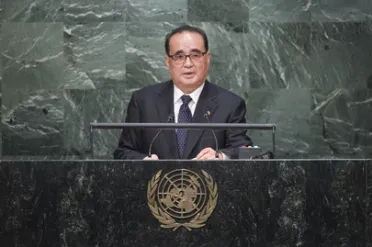Statement
Statement summary
RI SU YONG, Minister for Foreign Affairs of the Democratic People’s Republic of Korea, said the United Nations was at a crucial historic point as it drew upon the successes and learned from the failures of the past 70 years. It was fortunate that humankind had evaded a third world war over that period. “The peace demanded by humankind is not one that is fragile like a thin ice layer, but peace that is rock firm, durable and permanent,” he said. While the world had undergone tremendous changes, the United Nations mechanisms for peace and security were little different from the old stereotype formed at its founding. The arbitrariness and undemocratic practices of the Security Council had been redressed, and the Organization was continuously used as a confrontation arena by a few individual Powers. That was the biggest failure of the Organization’s 70‑year history and the greatest challenge in the road ahead.
In the twenty-first century, the Council continued to commit arbitrary acts against the Democratic People’s Republic of Korea and violated justice and international law, he said. International law defined the use of outer space as a sovereign right of every country and more than 10 countries had launched satellites. Yet the Council had passed a “resolution” prohibiting his country from launching satellites. Nine countries had already developed and conducted more than 2,000 nuclear tests. Yet again, the Council had adopted “resolutions” on prohibiting nuclear tests in his country, which had carried out such tests only three times. Last year, the United States launched yet another anti-Democratic People’s Republic of Korea campaign at the General Assembly and Council on the basis of the “Report of the Commission of Inquiry” on the human rights situation in the Democratic People’s Republic of Korea. It was fabricated with groundless evidence, thereby exposing that the Organization was still no more than a tool which could be abused by the United States. His country’s development of outer space for peaceful purposes was a legitimate right of a sovereign state, and its nuclear test was a self-defensive measure to cope with the hostile policy and nuclear threat of the United States.
Last August, the situation on the Korean peninsula had once again headed to the brink of war, he said. Though triggered by a small incident whose cause remained unknown, it was clear that such incidents occurred every time when the large-scale joint military exercises carried out by the United States and the Republic of Korea reached their height. The Democratic People’s Republic of Korea referred the exercises to the Council since they were threats to international peace and security. The Council remained silent on the referrals every time. It was crucial to replace the Armistice Agreement with a peace treaty without further delay, and it was high time for the United States to sign it. His Government was willing to hold constructive dialogue to prevent war and conflict on the Korean peninsula once the United States agreed to the new treaty without making claims about “someone’s provocation” through mass media.
Full statement
Read the full statement, in PDF format.
Photo

Previous sessions
Access the statements from previous sessions.
